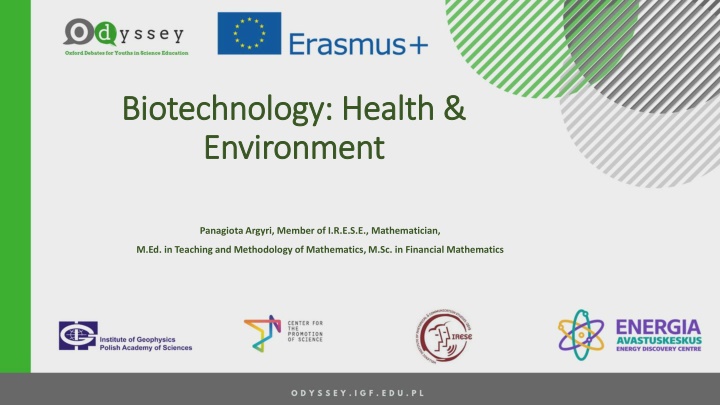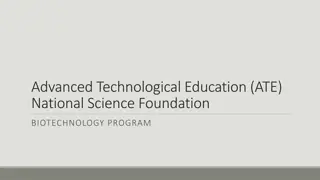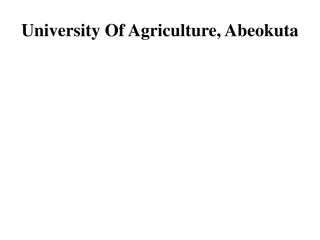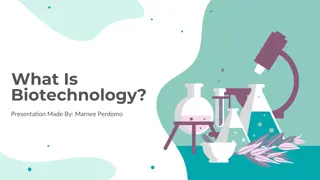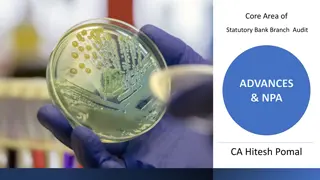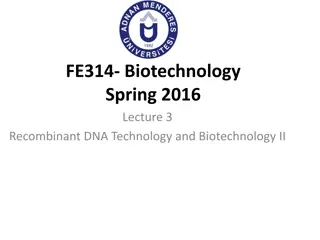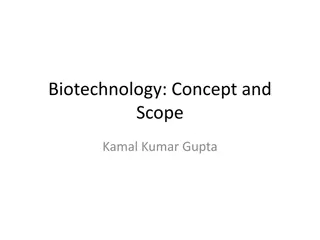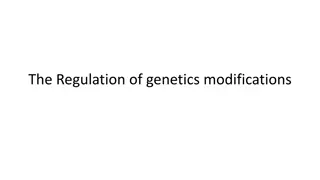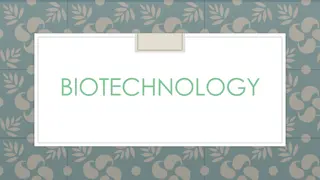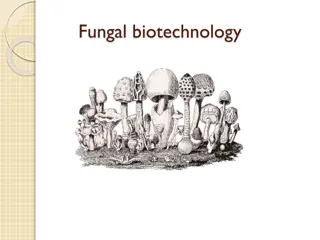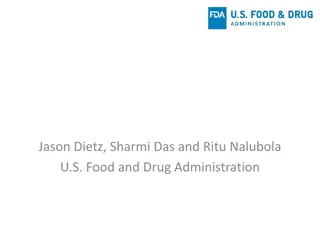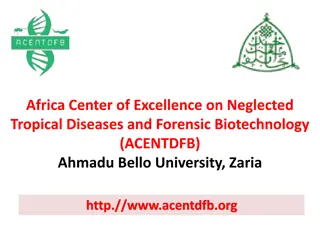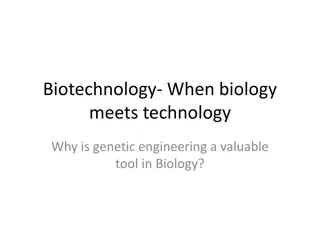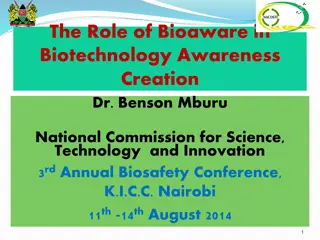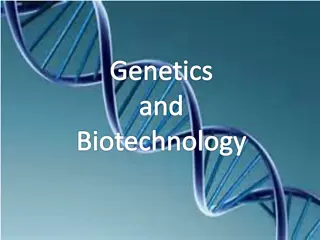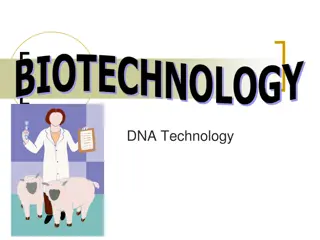Advances in Biotechnology: Transforming Health, Environment, and Science
The 21st century is witnessing remarkable progress in biotechnology, with significant discoveries shaping the fields of health, environment, and science. From the introduction of penicillin antibiotics to the creation of transgenic organisms, biotechnology continues to pave the way for innovative solutions to improve human health and address environmental challenges. Researchers are continuously pushing boundaries, exploring experimental methods to enhance human well-being and understanding the intricacies of genetic engineering. The future holds promise for further advancements in biotechnology, offering new possibilities for enhancing life and preserving our natural world.
Download Presentation

Please find below an Image/Link to download the presentation.
The content on the website is provided AS IS for your information and personal use only. It may not be sold, licensed, or shared on other websites without obtaining consent from the author.If you encounter any issues during the download, it is possible that the publisher has removed the file from their server.
You are allowed to download the files provided on this website for personal or commercial use, subject to the condition that they are used lawfully. All files are the property of their respective owners.
The content on the website is provided AS IS for your information and personal use only. It may not be sold, licensed, or shared on other websites without obtaining consent from the author.
E N D
Presentation Transcript
Biotechnology: Health & Biotechnology: Health & Environment Environment PanagiotaArgyri, Member of I.R.E.S.E., Mathematician, M.Ed. in Teaching and Methodology of Mathematics, M.Sc. in Financial Mathematics
Biotechnology at the heart of 21st century science Biotechnology at the heart of 21st century science The 21st century is characterized by rapid development and discovery of new technological and scientific achievements. Biotechnology is one of the scientific areas that has experienced rapid growth and progress in the recent years. The bio-sciences are the ones that play a central role in the development of technology and science and are directly linked to health, the natural environment, agriculture and industry.
Significant discoveries in the field of biotechnology 1928: biologist and pharmacologist: discovers the Penicillium mold that led to the introduction of penicillin antibiotics. Alexander Fleming, Scottish 1952: Alfred Hershey & Martha Chase, American geneticists and bacteriologists, confirm the role of DNA in heredity. 1972: Biochemist: molecules of recombinant DNA Paul Berg American the 951: fiction writer: introduces the term "genetic engineering" Jack Williamson: American science 1917: microbiological cultivation in an industrial process to produce starchy acetone that the United Kingdom desperately explosives during World War II. Chaim Weizmann uses pure created first needed for
Significant discoveries in the field of biotechnology 1973 The American biologist, Herbert Boyer, creates the first transgenic organism by inserting antibiotic resistance genes into the plasmid of an E. coli bacterium. 1994: Administration genetically modified food: the tomato The US Food and the Drug first approves 1971: microbiologist, develops a bacterium capable of breaking down the crude oil she proposed to use to treat oil spills. Ananda Chakrabarty, an American 1997: British scientists, led by Ian Wilmut of the Roslin Institute, report cloning the sheep Dolly using DNA from two adult sheep cells. 1974: Jaenisch creates a transgenic mouse by inserting foreign DNA into its embryo, making it the world's first transgenic animal. The German biochemist, Rudolf
Significant discoveries in the field of biotechnology Are many experimental methods being developed in the last decade that promise to improve human health or pose many risks? 2002: Rice becomes the first crop to express its genome. 2001: Creating a plan for the sequence of the human genome. It achievement of Medicine for scientists to decode how this sequence is interpreted by our cells and to understand how the genome works. is an important 2009: The Cedars-Sinai Heart Institute uses modified heart genes to create the first pacemakerin guinea pigs.
Genetically modified products & Ancient biotechnology Biotechnology in one form or another has been developed since prehistoric times. The discovery that fruit juices that have been fermented in wine or that milk could be turned into cheese or yogurt, or that beer could be made by fermenting malt and hops solutions, began the study of biotechnology.. The first breeders realized that the different physical characteristics could either be enlarged or lost by mating the appropriate pairs of animals involved in the handling of biotechnology. When the first bakers found that they could make a soft, spongy bread instead of a hard, thin crust, they were acting as newly established biotechnologists.
Genetically Modified Products: Rules & Legislation The first genetically modified organisms of plant origin were created simultaneously in Belgium (Gand, Leuven) and in USA, in 1983. We talk about tobacco plants that showed antibiotic resistance. In 1996, the European Union approved the import and use of soybeans in food and feed. This soybean along with modified corn are currently used in various processed foods sold in British stores. In 1993, the first modified plant (a type of tomato with slow-ripening characteristics) was commercialized in the United States.
Genetically Modified Products: Rules & Legislation In Europe, the entry into the GM food market follows the EEC Directive 1829/2003 on GM food and feed. The approach designed by ENTRANSFOOD, which provides guidance on the selection of appropriate methods of controlling the safety of GM foods, requires that their content be fully controlled in important nutrients and anti-nutritional substances. In 1999, the European Parliament passed a directive on market liberalization and the use of modified seeds, following a study showing that it was not possible to "infect" traditional crops with genetically modified ones. In January 2003, 21 applications were submitted for the introduction of GMOs in Europe. The EU's expert committee on the food chain has not been able to decide on the use of GM s.
VIDEO he revolution of the human genome Genetic engineering and diseases
QUESTIONS Biotechnology has been practiced since prehistoric times. Do you recognize progress and development in its applications and in which areas of modern societies? What are the developments and advances made by biotechnology applications in the health sector?
Scientific developments in molecular biology have resulted in recombinant DNA technology or "genetic engineering . Transfer / transfer of genetic material for cloning living and plant organisms: appearance of GMO- biotechnological agriculture.
Are GMOs Good or Bad? Genetic Engineering & Our Food Do biotechnology applications only have positive health effects?
It contributed to the discovery of treatments that reduce symptoms of painful diseases. It contributed to the reduction of the transmission of infectious diseases. Studies of the human genome have allowed us to understand more about genetic diseases and some cancers, creating more effective treatments. It contributed to the creation of vaccines. Biotechnology in the field of health.
Placing functional genes still does not show clear results. The health problems of the people are constantly increasing nowadays and the research medical community attributes many responsibilities to the current legislation on genetically modified foods and products. Genetically modified genes can replace other important genes, instead of mutated genes, causing the development of other forms of disease, compared to the elimination of existing ones. Genetic engineering as a field of biotechnology is recorded to have irreversible side effects, especially with regard to modified genes.
Genetic Engineering represents our most hopeful thoughts, but also our most inward fears. " JEREMY RIFKIN, Author - President of the Foundation for Economic Tendencies (USA) Biotechnology applications are the Biotechnology applications are the enemy of human health? enemy of human health?
Biotechnological crops i) Causing disorders in ecosystems. ii) Loss and changes in natural variety and genetic differentiation in various life forms. i) Less use of herbicides and insecticides. ii) Increased resistance to disease. iii) Increased food production for the growing human population. iv) Dealing with the problem of hunger and malnutrition, which currently plagues a very large number of countries worldwide.
